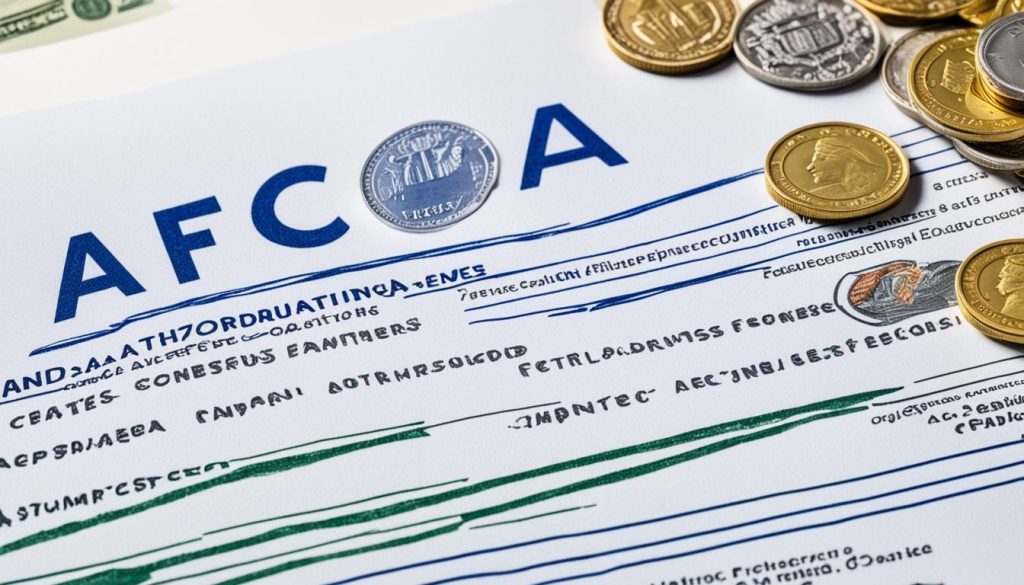If your firm needs to be authorised by the Financial Conduct Authority (FCA), it’s important to understand the process and requirements. To apply for FCA authorisation, you’ll need to demonstrate that your firm can comply with current rules and guidance, as well as any future regulations introduced by the FCA. It’s essential to be prepared, organized and willing to comply with regulatory obligations before submitting your application. The application process typically takes 6 to 12 months, depending on the type of firm. You’ll also need to pay an application fee.
Understanding FCA Authorisation
Before applying for FCA authorisation, it’s crucial to have a thorough understanding of the process and the expectations set by the Financial Conduct Authority (FCA).
The FCA places a strong emphasis on compliance with current and future rules and guidance. Therefore, it’s important for firms to take regulation seriously and demonstrate preparedness to meet regulatory obligations.
During the authorisation process, your firm will be required to submit the application through the FCA’s Connect system. Additionally, you will need to pay the application fee.
It’s essential to provide high-quality financial information and be ready to address any questions or seek clarification from the FCA. Having a clear understanding of the requirements and expectations will help streamline the application process.
By understanding the stages involved and the FCA’s compliance requirements, you can navigate the authorisation process with confidence and increase your chances of a successful application.
How to Apply for FCA Authorisation?
The FCA authorisation process involves the assessment of your application by a case officer. They will review your business to ensure it meets the minimum standards set by the FCA. The assessment includes checking your application against information held by other regulatory agencies in the UK or overseas.
Throughout the process, the case officer may have follow-up questions, request additional documentation, or arrange calls or meetings with you. You can track the progress of your application through the Connect system and make corrections or amendments if necessary.
If you make significant changes that indicate you’re not ready, the FCA may ask you to withdraw your application and reapply.
FCA Authorisation Requirements
To obtain FCA authorisation, your firm must meet certain requirements to ensure compliance with the Financial Conduct Authority’s (FCA) regulations. These requirements ensure that your firm operates in line with the FCA’s principles of business and adheres to relevant rules outlined in their Handbook.
The FCA sets out specific threshold conditions for FSMA (Financial Services and Markets Act) firms, which are the minimum standards that must be met. Additionally, the FCA provides guidelines outlining expectations for payments and e-money firms in their approach document. Each type of firm or business model has its own set of requirements and forms to complete.
When applying for FCA authorisation, it is crucial to provide all necessary information and be clear and specific about your firm’s activities. This includes demonstrating how you will effectively manage any conflicts of interest that may arise.
Guidelines for FCA Authorisation
The FCA provides comprehensive guidance for each specific area to help you understand and meet the requirements for authorisation.
- Principles of Business: Your firm must comply with the FCA’s principles of business, which set out high-level standards for conduct, integrity, and client relationships.
- Handbook Rules: Your firm must adhere to the relevant rules in the FCA Handbook, which outline detailed requirements for various financial activities.
- Threshold Conditions: FSMA firms must satisfy the threshold conditions specified by the FCA, ensuring that they have the necessary resources, skills, and integrity to conduct regulated activities.
- Payments and E-Money: Payments and e-money firms must meet specific expectations outlined in the FCA’s approach document, which cover areas such as safeguarding customer funds and maintaining adequate financial reserves.
It is essential to familiarize yourself with the requirements applicable to your firm’s specific operations and ensure that you complete all the necessary forms accurately and comprehensively.
You can also search the FCA register to find authorised firms that operate within similar sectors or industries. This allows you to benchmark against established firms and ensure that you meet comparable standards in your authorisation process.
Sample Table: FCA Authorisation Requirements
| Requirement | Description |
|---|---|
| Governance Structure | Establish a robust governance structure with clear lines of responsibility and accountability. |
| Fit and Proper Test | Demonstrate that the individuals responsible for key roles within your firm meet the FCA’s fit and proper criteria. |
| Compliance Policies and Procedures | Have adequate compliance policies and procedures in place to ensure ongoing adherence to regulatory requirements. |
| Financial Resources | Show that your firm has sufficient financial resources to meet its obligations and potential liabilities. |
| Client Money Protection | Implement effective systems to protect client money and assets in accordance with the FCA’s rules. |

FCA Authorisation Fees
When applying for FCA authorisation, you’ll be required to pay an application fee. The fee depends on the complexity of your application. It’s important to consider this cost as part of your budget and be prepared to pay it when submitting your application. The FCA will provide the specific fee amount and payment instructions during the application process.
Having a clear understanding of the fca authorisation fees is crucial for businesses looking to obtain an FCA license. The fees are determined based on the complexity of your application, which means that the more complex or risky your business activities are, the higher the fees will be. These fees are designed to cover the costs associated with processing, reviewing, and assessing your application.
It’s essential to prepare your budget accordingly and allocate the necessary funds to cover the cost of an FCA license. Failure to factor in these fees may delay the authorisation process or result in an incomplete application. Remember, obtaining an FCA license is an investment in your business’s credibility and regulatory compliance, so it’s important to allocate the necessary resources for a successful application.
Understanding the FCA Authorisation Fee Structure
The FCA follows a tiered fee structure based on the type and complexity of your business activities. Here’s a breakdown of the main factors that determine the fca authorisation fees:
- The riskiness and complexity of your business: The FCA assesses the risk level associated with your business model and the complexity of the financial products or services you plan to offer. Higher-risk or complex businesses are likely to face higher fees.
- The revenue and size of your firm: The FCA may consider your firm’s annual revenue or assets as factors when determining the appropriate fee. Larger firms with higher revenue are usually subject to higher fees.
- The resources required for assessment and supervision: The FCA takes into account the resources and effort required to thoroughly assess and supervise your firm. Factors such as the level of documentation, external approvals, and ongoing compliance monitoring may influence the fee.
It’s important to note that the FCA provides guidelines and a fee calculator tool on their website to help you estimate the cost of an FCA license. However, the final fee amount will be determined by the FCA after reviewing your application and assessing its complexity and risk level.
Payment of FCA Authorisation Fees
Once you’ve submitted your application, the FCA will provide you with detailed instructions on how to pay the FCA authorisation fees. The payment process can typically be completed online or via bank transfer, and you’ll need to ensure that you meet the specified deadline to avoid any delays in processing your application.
After you’ve paid the required fee, the FCA will continue with the assessment process and review your application based on the information provided. It’s important to keep track of the progress of your application and promptly respond to any requests for additional information or clarification to ensure a smooth and efficient process.
As you plan your journey towards obtaining an FCA license, it’s crucial to consider and prepare for the fca authorisation fees. Allocate sufficient resources in your budget and be ready to pay the required fee when submitting your application. By understanding the fee structure and payment process, you can navigate the authorisation process confidently and increase your chances of obtaining the FCA license for your business.

After FCA Authorisation
Once your firm is authorised by the FCA, you can proceed with the regulated activities you applied for. This means you can operate within the specified scope of your authorisation and offer your services to clients and customers.
It’s important to note that FCA authorisation is not indefinite. The FCA regularly reviews firms’ authorisations to ensure ongoing compliance with regulatory requirements and to protect consumers. As a result, your authorisation may need to be renewed or updated periodically.
To maintain your FCA authorisation status, it’s crucial to stay updated on any changes or requirements that may affect your business. The FCA may introduce new regulations or modify existing rules, and it’s your responsibility to stay informed and adapt accordingly.
Monitoring the status of your FCA authorisation is essential in order to comply with any renewal or update requirements. You should regularly check your authorisation status on the FCA register to ensure that it remains active and up to date.
If your FCA authorisation does expire, you may no longer be able to provide regulated activities until it is renewed or updated. This can have a significant impact on your business operations and the services you offer.
Additionally, the FCA offers a graduate scheme for individuals interested in pursuing a career in financial regulation. The FCA Authorisation Graduate Scheme provides opportunities for recent graduates to work in various departments within the FCA, gaining valuable experience and knowledge in the field of financial regulation.
By participating in the FCA Authorisation Graduate Scheme, individuals can develop a solid foundation in financial regulation and gain insight into the FCA’s role in safeguarding the integrity of the financial industry.

Key Points about FCA Authorisation and Status
| Key Points |
|---|
| Authorised firms can proceed with regulated activities |
| FCA authorisation may need to be renewed or updated periodically |
| Stay updated on changes or requirements that may affect your business |
| Monitor the status of your FCA authorisation regularly |
| Expired authorisation may impact your ability to provide regulated activities |
| Consider joining the FCA Authorisation Graduate Scheme for career opportunities in financial regulation |
Conclusion
Obtaining FCA registration is a vital requirement for businesses operating in the financial sector. It signifies a commitment to complying with regulatory standards and offers credibility to clients and customers. To apply for FCA registration, it is crucial to fully understand the requirements and adequately prepare your application to ensure its complete and high-quality. Throughout the application process, maintaining open and honest communication with the FCA is essential, as it allows you to address any queries or requests for additional documentation promptly.
Once your business is authorised and regulated by the FCA, you gain the ability to conduct regulated activities, instilling confidence and trust among your clientele. The FCA registration carries significant weight in the financial industry and is instrumental in establishing your business’s reputation. It demonstrates your commitment to compliance and upholding the highest professional standards.
By being regulated by the FCA, you align your business with the industry’s regulatory framework and increase transparency. This not only protects your customers but also enhances your business’s credibility and reputation. FCA regulation sets you apart from unregulated competitors, providing peace of mind to clients who prioritize working with regulated entities.
FAQs
What is involved in the FCA authorisation process?
The FCA authorisation process involves submitting your application, which is then assessed by a case officer. They may have follow-up questions or request additional documentation. You can track the progress of your application through the Connect system.
How do I search for authorised firms on the FCA register?
You can search the FCA register to find authorised firms and ensure you meet similar standards.
How much does an FCA license cost?
The application fee for FCA authorisation depends on the complexity of your application. The specific fee amount and payment instructions will be provided during the application process.
What happens after my firm is authorised by the FCA?
Once authorised, you can proceed with the regulated activities you applied for. It’s important to stay updated on the status of your FCA authorisation and be aware of any changes or requirements that may affect your business.
What are the benefits of being regulated by the FCA?
FCA authorisation demonstrates compliance with regulatory standards and provides credibility to clients and customers.





